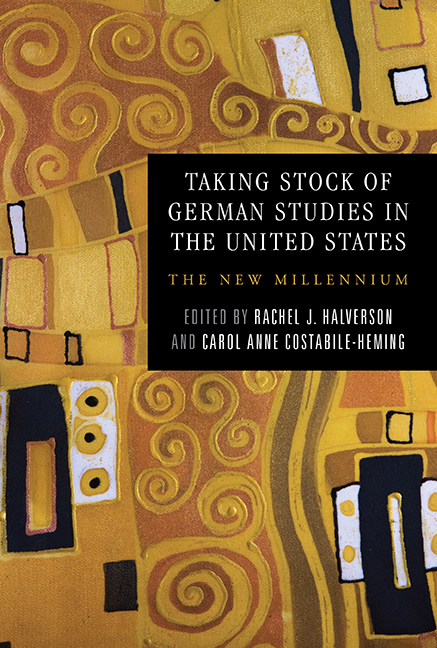13 - An Immodest Proposal: Reenvisioning German Studies through European Integration
Published online by Cambridge University Press: 10 June 2021
Summary
Nations, for instance, can be found everywhere in their transnational productions, and they appear in even greater relief owing to the extent to which they define themselves against ostensibly other persons bearing foreign objects.
—Brad PragerConsidering the Future
AFTER ALL THE INK that has been spilled over the “crisis” in the study of German in the United States in the last twenty years, it seems almost arrogant to propose yet another solution. Yet, as scholars who have spent our professional lives invested in what gradually turned into “German studies,” we feel obliged to give it—if readers will forgive the pun—the old college try, since neither of us sees the study of German continuing in its present form in higher education in the United States. Hence, we write not as dispassionate observers of a shift in academic trends already under way, but as advocates for a new paradigm. We think that German studies will change in any event and that, in fact, it should do so. To be clear from the outset: we are proposing a reconfiguration of the field (the larger concern) as well as a specific course of study (an undergraduate major/minor in Transnational European Studies). Our goal in this essay is therefore to lay out our case as to how this might best be done.
Ours is not a universally applicable blueprint. Durable, promising, viable programs will naturally continue in their current configuration. However, we all know that for every such example there are many more smaller programs struggling along, some already on the chopping block. Anecdotal evidence suggests that small programs that have been cut in the wake of the 2008 financial crisis, a crisis that hit university budgets well before that date, have not yet fully shown up in the Modern Language Association's (MLA) data. Yet even privileged, well-endowed institutions that seem to be able to afford the luxury of small enrollments may wish to rethink the relevance of their German studies programs to the university's larger mission as well as their place within American higher education. As deans and provosts consider and initiate changes, now is the time to insert ourselves into the discussion and become part of that planning.
- Type
- Chapter
- Information
- Taking Stock of German Studies in the United StatesThe New Millennium, pp. 272 - 290Publisher: Boydell & BrewerPrint publication year: 2015
- 1
- Cited by



